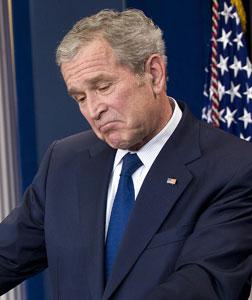I wouldn't reconsider my vote for Barack Hussein Obama, in other words, and when he takes the oath, I hope to have a ringside seat. ... But, on the last day of his presidency, I want to say why I still do not wish that Al Gore had beaten George W. Bush in 2000 or that John Kerry had emerged the victor in 2004.
The answer, I am reasonably certain, is that it is the events of Sept. 11, 2001, that explain the transformation of George Bush from a rather lazy small-government conservative into an interventionist, in almost every sense, politician. ... We are never invited to ask ourselves what would have happened if the Democrats had been in power that fall. But it might be worth speculating for a second. The Effective Death Penalty and Anti-Terrorism Act, rushed through both Houses by Bill Clinton after the relative pin ***** of the Oklahoma City bombing, was correctly described by the American Civil Liberties Union as the worst possible setback for the cause of citizens' rights. Given that precedent and multiplying it for the sake of proportion, I think we can be pretty sure that wiretapping and water-boarding would have become household words, perhaps even more quickly than they did, and that we might even have heard a few more liberal defenses of the practice. I don't know if Gore-Lieberman would have thought of using Guantanamo Bay, but that, of course, raises the interesting question—now to be faced by a new administration—of where exactly you do keep such actually or potentially dangerous customers, especially since you are not supposed to "rendition" them. There would have been a nasty prison somewhere or a lot of prisoners un-taken on the battlefield, you can depend on that.
We might have avoided the Iraq war, even though both Bill Clinton and Al Gore had repeatedly and publicly said that another and conclusive round with Saddam Hussein was, given his flagrant defiance of all the relevant U.N. resolutions, unavoidably in our future. And the inconvenient downside to avoiding the Iraq intervention is that a choke point of the world economy would still be controlled by a psychopathic crime family that kept a staff of WMD experts on hand and that paid for jihadist suicide bombers around the region. In his farewell interviews, President Bush hasn't been able to find much to say for himself on this point, but I think it's a certainty that historians will not conclude that the removal of Saddam Hussein was something that the international community ought to have postponed any further. (Indeed, if there is a disgrace, it is that previous administrations left the responsibility undischarged.)
The obvious failures—in particular the increasing arrogance and insanity of the dictatorships of Iran and North Korea—are at least failures in their own terms: failure to live up to the original rhetoric and failure to mesh human rights imperatives with geo-strategic and security ones. Again, it's not clear to me how any alternative administration would have behaved. And the collapse of our financial system has its roots in a long-ago attempt, not disgraceful in and of itself, to put home ownership within reach even of the least affluent. So the old question "compared to what?" does not allow too much glibness.
The answer, I am reasonably certain, is that it is the events of Sept. 11, 2001, that explain the transformation of George Bush from a rather lazy small-government conservative into an interventionist, in almost every sense, politician. ... We are never invited to ask ourselves what would have happened if the Democrats had been in power that fall. But it might be worth speculating for a second. The Effective Death Penalty and Anti-Terrorism Act, rushed through both Houses by Bill Clinton after the relative pin ***** of the Oklahoma City bombing, was correctly described by the American Civil Liberties Union as the worst possible setback for the cause of citizens' rights. Given that precedent and multiplying it for the sake of proportion, I think we can be pretty sure that wiretapping and water-boarding would have become household words, perhaps even more quickly than they did, and that we might even have heard a few more liberal defenses of the practice. I don't know if Gore-Lieberman would have thought of using Guantanamo Bay, but that, of course, raises the interesting question—now to be faced by a new administration—of where exactly you do keep such actually or potentially dangerous customers, especially since you are not supposed to "rendition" them. There would have been a nasty prison somewhere or a lot of prisoners un-taken on the battlefield, you can depend on that.
We might have avoided the Iraq war, even though both Bill Clinton and Al Gore had repeatedly and publicly said that another and conclusive round with Saddam Hussein was, given his flagrant defiance of all the relevant U.N. resolutions, unavoidably in our future. And the inconvenient downside to avoiding the Iraq intervention is that a choke point of the world economy would still be controlled by a psychopathic crime family that kept a staff of WMD experts on hand and that paid for jihadist suicide bombers around the region. In his farewell interviews, President Bush hasn't been able to find much to say for himself on this point, but I think it's a certainty that historians will not conclude that the removal of Saddam Hussein was something that the international community ought to have postponed any further. (Indeed, if there is a disgrace, it is that previous administrations left the responsibility undischarged.)
The obvious failures—in particular the increasing arrogance and insanity of the dictatorships of Iran and North Korea—are at least failures in their own terms: failure to live up to the original rhetoric and failure to mesh human rights imperatives with geo-strategic and security ones. Again, it's not clear to me how any alternative administration would have behaved. And the collapse of our financial system has its roots in a long-ago attempt, not disgraceful in and of itself, to put home ownership within reach even of the least affluent. So the old question "compared to what?" does not allow too much glibness.





Comment